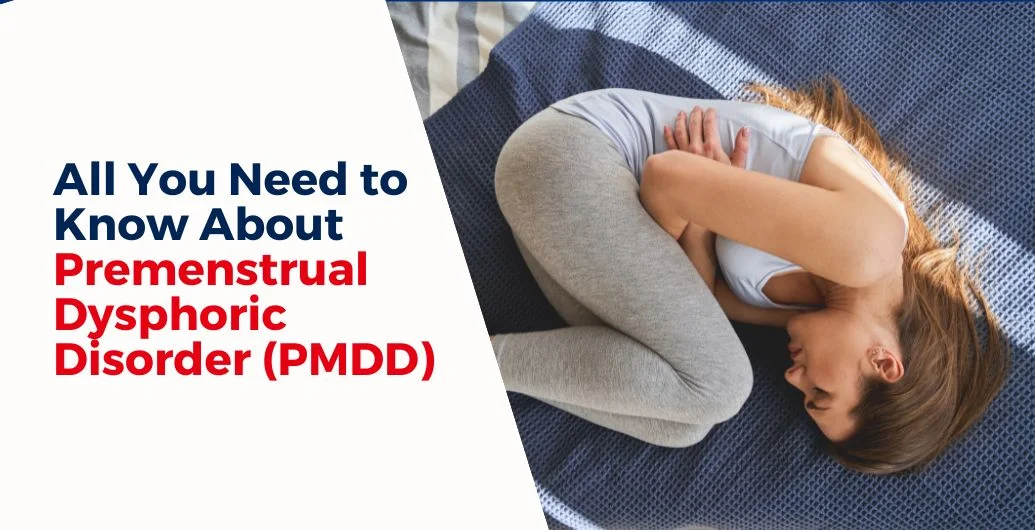Premenstrual dysphoric disorder (PMDD) is a severe, sometimes disabling extension of premenstrual syndrome (PMS). Although PMS and PMDD both have physical and emotional symptoms, PMDD causes extreme mood shifts that can disrupt daily life and damage relationships.
The best way to describe PMDD is that, once a month, you press your own self-destruct button and let your(usually very happy and satisfying) life implode around you. Then, when the dark thoughts lifted and cleared, you spent the next two weeks trying to pick up the pieces.
Table of contents
How common is this condition?
PMDD affects up to 10% of women or people assigned female at birth (AFAB) of reproductive age. From 5% of women of childbearing age. Many women with PMDD may also have anxiety or depression.
What are the symptoms of PMDD?
If you have PMDD, you may experience some of the symptoms listed below. But it’s different for different people, so you might also experience other feelings that aren’t listed here.
Psychological symptoms
- Irritability
- Nervousness
- Lack of control
- Agitation
- Anger
- Insomnia
- Difficulty in concentrating
- Depression
- Severe fatigue
- Anxiety
- Confusion
- Forgetfulness
- Poor self-image
- Paranoia
- Emotional sensitivity
- Crying spells
- Moodiness
- Trouble sleeping
Fluid retention
- Swelling of the ankles, hands, and feet
- Periodic weight gain
- Diminished urine output
- Breast fullness and pain
- Respiratory problems
Gastrointestinal symptoms
- Abdominal cramps
- Bloating
- Constipation
- Nausea
- Vomiting
- Pelvic heaviness or pressure
- Backache
Neurologic and vascular symptoms
- Headache
- Dizziness
- Fainting
- Numbness, prickling, tingling, or heightened sensitivity of arms and/or legs
- Easy bruising
- Heart palpitations
- Muscle spasms
Other
- Decreased coordination
- Painful menstruation
- Diminished sex drive
- Appetite changes
- Food cravings
- Hot flashes
For some people, symptoms of PMDD last until menopause.
What causes PMDD?
Experts don’t know why some people get PMDD. Decreasing levels of estrogen and progesterone hormones after ovulation and before menstruation may trigger symptoms. Serotonin, a brain chemical that regulates mood, hunger, and sleep, may also play a role. Serotonin levels, like hormone levels, change throughout your menstrual cycle.
Research suggests various causes and aggravating factors for PMDD. Some of these possible factors are:
- Genetics. Some research suggests that increased sensitivity to changes in hormone levels may be caused by genetic variations.
- Smoking can have an impact on your hormone sensitivity.
- Trauma and stress. Other research has shown that in some cases PMDD may be linked to stressful and traumatic past events, such as emotional or physical abuse.
How is PMDD Diagnosed and Treated?
Your doctor will talk to you about your health history and do a physical examination. You will need to keep a calendar or diary of your symptoms to help your doctor diagnose PMDD. You must have five or more PMDD symptoms, including one mood-related symptom, to be diagnosed with PMDD.
Treatments for PMDD include:
- Antidepressants are called selective serotonin reuptake inhibitors (SSRIs). SSRIs change serotonin levels in the brain.
- Birth control pills.
- Over-the-counter pain relievers may help relieve physical symptoms, such as cramps, joint pain, headaches, backaches, and breast tenderness.
- Stress management, such as relaxation techniques and spending time on activities you enjoy.
Making healthy changes, such as eating a healthy combination of foods across the food groups, cutting back on salty and sugary foods, and getting more physical activity, may also help relieve some PMDD symptoms.
Also Read: PCOS Diet Meal Plan (Philippines)
What Can You Expect if You Have PMDD?
With treatment, most people with PMDD get relief from their symptoms and can enjoy life more fully. Without treatment, PMDD can trigger depression and even suicide. It can also take a severe toll on your relationships and career.
If you or someone you know is thinking about suicide, call or text 0966-351-4518. You can also call 8804-4673. The National Center for Mental Health Crisis Hotline provides free and confidential support 24/7, day or night. You can also call 911 or the local emergency number or go to the hospital emergency room. DO NOT DELAY.
Also Read: World Mental Health Day 2023: Breaking Free from Outdated Stigmas
Frequently Asked Questions (FAQs)
What are 3 symptoms of premenstrual dysphoric disorder?
Key points about PMDD
- Depressed mood.
- Anger or irritability.
- Trouble concentrating.
Is PMDD a mental illness?
An endocrine condition, or disorder related to hormones, is the usual definition of PMDD. In addition to physical symptoms, individuals with PMDD may also have a variety of mental health symptoms, including anxiety, depression, and suicidal thoughts.
Why do I feel so crazy before my period?
Comparable to premenstrual syndrome (PMS), but more severe, is premenstrual dysphoric disorder (PMDD). Severe anger, sadness, or anxiety are symptoms of PMDD that appear one or two weeks before to the onset of your period. Usually, the symptoms subside two to three days after the onset of your period.
How do you stop PMS depression?
Diet and lifestyle changes. Premenstrual symptoms are often lessened by regular exercise. Reducing coffee intake, abstaining from alcohol, and quitting smoking also help to reduce symptoms. It also helps to get adequate sleep and practice relaxation methods like yoga, meditation, and mindfulness.
Final Thoughts
Premenstrual Dysphoric Disorder (PMDD) is a severe form of premenstrual syndrome affecting up to 10% of women of reproductive age. It leads to extreme mood shifts and physical discomfort, disrupting daily life. While hormonal fluctuations play a role, genetic factors and past trauma may exacerbate symptoms. Diagnosis involves tracking symptoms over cycles, with treatment options including antidepressants, birth control pills, and lifestyle changes. With proper treatment, most individuals experience relief, but untreated PMDD can lead to severe depression and suicide. Immediate support is available through crisis hotlines and emergency services for distressed people.
Keep Reading:L’Oréal Paris PH celebrates defying expectations, embracing self-worth

Leave a Reply